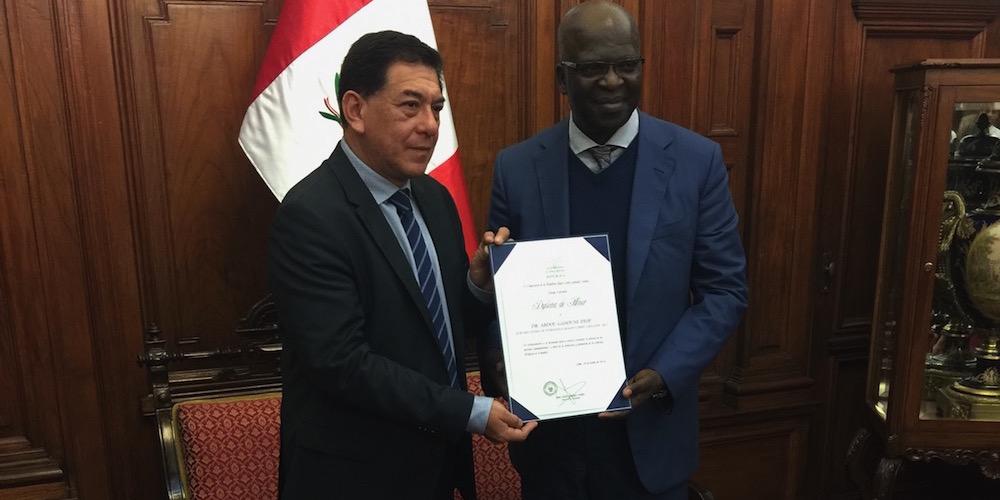
Years of quiet diplomacy and careful public advocacy by Seventh-day Adventist Church members in Peru have yielded significant religious freedom gains, according to Ganoune Diop, director of Public Affairs and Religious Liberty for the Adventist world church. Diop visited the country in November 2018 to take part in a four-day series of events, which included a religious liberty conference, a training program for Adventist pastors, and visits with national government officials and leaders of other denominations.
“This ongoing commitment to engage with public leaders, and to educate Adventist laypeople and pastors about religious freedom issues, is helping position the church in Peru to a standing of relevance, trust, and credibility in the public realm,” Diop said. “This, in turn, supports the ability of the church to pursue its mission — which is the goal that drives the work of Public Affairs and Religious Liberty around the world.”
![Public Affairs and Religious Liberty department director Ganoune Diop (right), being honored by the National Congress in Peru for his advocacy efforts on behalf of religious liberty and freedom of conscience. [Photo: Public Affairs and Religious Liberty]](https://adventistreview.org/wp-content/uploads/2022/01/Diop_honored_Peruvian_Congress.8258.jpg)
Before 2010, religious minorities in Peru did not enjoy the same level of legal protection or support as the country’s dominant religion. Almost a decade ago, Adventists began advocating for legislation that would bring equality among religious groups and which would strengthen the legal protection of religious freedom. In 2009, Adventists organized the country’s largest-ever religious freedom rally, bringing some 40,000 people together in the National Stadium of Lima. The event was attended by government ministers, the president of the Supreme Court, ambassadors, and other officials, as well as religious leaders representing Muslims, Jews, and Evangelicals. Before the rally, an estimated 10,000 church members walked through the streets of the capital, Lima, thanking the government for its protections of religious freedom, and raising awareness of continuing challenges.
The following year, Peru’s national legislature passed landmark religious freedom legislation that extended already-existing constitutional guarantees of religious freedom and added protections for students whose religious beliefs affected their ability to attend class or take exams on certain days.
The latest events in Peru took place October 24-27, 2018 and were organized by local Adventist leaders. Joining Diop on the visit was Helio Carnassale, Public Affairs and Religious Liberty director for the South America Division (SAD) region, and together they led a number of training seminars for pastors and church members.
The two were also invited to visit Peru’s National Congress, where Diop was honored by Congressman Juan Carlos Gonzales Ardiles, a noted human rights and religious freedom advocate. Congressman Gonzales Ardiles presented Diop with a plaque acknowledging his many years of work around the world promoting freedom of religion or belief.
Diop and Carnassale also met with administrators and faculty from Peruvian Union University, the second-largest Adventist university in South America, with more than 13,000 students. The school offers some 40 degree programs and since 2012 has operated a school of medicine — the fifth medical school in the Adventist Church’s worldwide education system.
In their meeting, the two church officials discussed challenges which, according to Diop, are shared by religiously affiliated educational institutions in many countries.
“When a student body is diverse — made up of students from many different religious traditions, or with no religious beliefs at all — the question often becomes: How can we maintain an Adventist environment that upholds core beliefs and values but which doesn’t intrude on individual students’ rights and freedoms?" Diop cited, for instance, questions on issues such as enforced chapel attendance, Sabbath observance, and expectations about standards of dress or behavior.
Diop said this could be a delicate balancing act for university administrators. "These are very practical issues, but they should also be informed by an understanding of religious freedom principles. This includes the right of an institution to create and maintain a culture on campus that’s infused with a particular religious worldview. However, it’s equally important to acknowledge personal freedoms, such as the right to one’s own beliefs and the ability to act according to those beliefs."
Engaging with questions such as these is a little-known but vital aspect of the work of Public Affairs and Religious Liberty within the Adventist world church, Diop said.
The original version of this story is posted on the Public Affairs and Religious Liberty site.